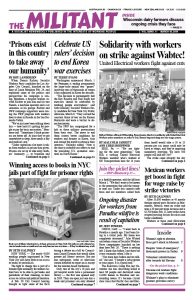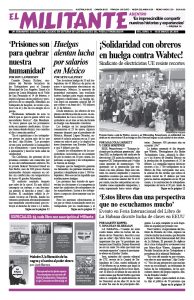The U.S. government March 4 opened the door to lawsuits against a restricted list of Cuban companies using land or properties that were nationalized under workers control in Cuba in the early years of the revolution.
The Washington Post notes that the measure, which takes effect March 19, for the time being is limited. The State Department announcement confines the companies that can be sued to those on the State Department’s “List of Restricted Entities and Subentities Associated with Cuba.”
The lawsuits are allowed under “Title III” of the so-called Cuban Liberty and Democratic Solidarity (Libertad) Act, also known as the Helms-Burton Act, signed into law by President Bill Clinton in 1996.
Since the law was passed, every president — Democrat or Republican — has repeatedly suspended Title III, usually for six months at a time, because of the economic chaos it could produce. But the March 5 announcement renewed it for just 30 more days, while lifting it for the companies on the restricted list.
Few, if any, of the 200 or so hotels, stores, tourist companies and other entities on the list have any links to the U.S. legal or financial system.
The U.S. government already “forbids U.S. citizens from engaging in direct financial transactions” with the companies on “this arbitrary and illegitimate list,” said a March 4 statement by Cuba’s Ministry of Foreign Affairs.
The move is part of broader threats by the Donald Trump administration to tighten the nearly 60-year embargo of Cuba, including false claims that Cuba is responsible for the economic and social crisis in Venezuela today.
The State Department announcement claims that the “entities” on the list are “under the control of Cuban military, intelligence, or security services” and repeats the slander that these are “directly responsible for the repression of the Cuban people.”
The Cuban people’s real crime is their revolution itself.
The nationalizations of U.S.-owned oil refineries, the electric and telephone companies, and large agricultural estates in 1959 and 1960 were part of mobilizations of working people in Cuba to gain ever greater control over conditions on the job and the management and priorities of production. This was a central part of deepening their social revolution.
These moves were backed up by the new revolutionary workers and farmers government led by Fidel Castro.
The nationalizations “were not confiscating land,” Castro explained in a Sept. 26, 1960, speech to the U.N. General Assembly. “We simply propose to pay for it … in the only way we could — by bonds that would mature in 20 years.”
Washington refused. Instead, it launched the economic, financial and commercial blockade against Cuba, which it has maintained — at times tighter, at times looser — to this day.
“The United States will keep on failing to achieve its main purpose of submitting by force the sovereign will of Cubans and our determination to build socialism,” the Cuban Ministry of Foreign Affairs said March 4.

